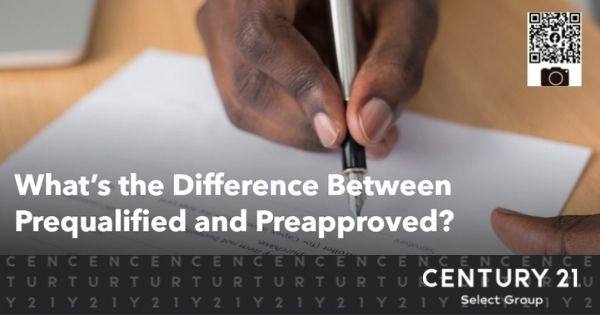What’s the Difference Between Prequalified and Preapproved?
The homebuying process comes with a language all its own, and two of the terms you may have heard are prequalified and preapproved. While both can be essential parts of obtaining a mortgage and buying a home, you may not know what they mean. Check out the information below to learn how each term may benefit you during your home search.

What Does it Mean to Prequalify?
When you prequalify for a home loan, it means you’re getting an estimate of how much you may be able to borrow based on the information you provide about your finances and your credit check. While it isn’t as formal as being preapproved, getting prequalified is an excellent first step when you begin your home search, as it will help you establish your budget and know how much you may be able to borrow. This process will also introduce you to the various mortgage options you have to choose from.

Information needed for prequalification includes:
- Credit check
- Income information
- Debts and assets
- Bank account information
- Down payment amount
The prequalification can be completed online, over the phone, or in person. You’ll receive a prequalification lender, which you can use to show an agent or seller that you’re serious about buying. Although it can be helpful, a prequalification isn’t seen as being as serious as preapproval. The lender goes off the information you provided and does not verify everything you’ve given them is correct, up to date, and comprehensive. Meaning, while you may get a loan for the amount stated, it can also change when a lender does a more thorough check.

What Does it Mean to be Preapproved?
The preapproval process involves a lender investigating your income, assets, credit history, and debts before providing you with an amount they believe you can afford. Getting preapproved confirms to the seller that you’re serious about buying their home and that you can secure a mortgage, making you more likely to complete the purchase. Being preapproved can be extremely valuable in a competitive market, as it will help you stand out from the other homebuyers.
You don’t have to receive prequalification for preapproval. If you know you’re financially prepared to buy, you can decide to move ahead to the preapproval process.
Information needed for preapproval may include:
- Credit check
- Paystubs from the last thirty days
- Bank statements from the previous two months from all accounts
- Investment account statements from the last two months
- W-2 and 1099 statements from the previous two years
- Federal tax returns from the last two years
- Driver’s license
- Social security number
- Total monthly expenses
- Down payment amount
Additionally, if someone is helping you pay for the home, you’ll need a gift letter signed and dated by the individual assisting you.
Once you submit this information to a lender, you should receive their decision within ten business days. If you are preapproved, you’ll receive a preapproval letter informing you of the offer to lend you a specific amount for sixty or ninety days, along with the type of mortgage the lender is willing to offer. Since the lender verifies the information you provided, this is a much more serious step than prequalification.
While you may receive preapproval for a mortgage, it’s important to remember it does not guarantee a mortgage. If there is a change to your income, assets, or debt level before the closing date, a lender may decide to deny the loan.
Prequalification and preapproval are just a part of the mortgage application process. Check out this list of nine things to consider before and during this critical part of the journey to finding your next home.
By Nathan Smith




